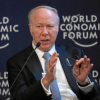David Gergen

David Gergen
David Richmond Gergenis an American political commentator and former presidential advisor who served during the administrations of Richard Nixon, Gerald Ford, Ronald Reagan, and Bill Clinton. He is currently a Senior Political Analyst for CNN and a Professor of Public Service and Co-Director of the Center for Public Leadership at the Harvard Kennedy School. Gergen is also the former Editor-at-Large of U.S. News and World Report and a contributor to CNN.com and Parade Magazine. He has twice been a member...
NationalityAmerican
ProfessionTV Show Host
Date of Birth9 May 1942
CountryUnited States of America
I don't have any problem with a reporter or a news person who says the President is uninformed on this issue or that issue. I don't think any of us would challenge that. I do have a problem with the singular focus on this, as if that's the only standard by which we ought to judge a president. What we learned in the last administration was how little having an encyclopedic grasp of all the facts has to do with governing.
Ronald Reagan rebuilt the American presidency; it was in trouble when he came into office as an institution, and he did through his communications and through his own inspiration, and his principles. I think he did lift our spirits about, and convince us that once again that the future of the best, our best days were always ahead of us.
If you've got some news that you don't want to get noticed, put it out Friday afternoon 4:00 pm.
There is a cannibalism that's loose in our society in which public figures such as the Clintons could try to come into this town and do something good for this country and then they get hammered away even though they're trying to do the right thing.
We are making politics a spectator sport in which our only duty is to vote somebody into office and then retire to the grandstands.
I think there's some generational difference between some of the older members of the press and this younger president [Bill Clinton]. I think the older members are not quite on the same wave length, and in general. I think it's been very devastating to the president.
Leadership is about calling people to do things beyond themselves.
It's very, very hard to speak truth to power when the truth is unpleasant. I think it's one of the toughest things especially a young person has to do and the only way you can do it is if you're willing to walk out the door if he doesn't take your advice. Or if you're willing to walk out the door if he goes over the line.
At the heart of leadership is the leader's relationship with followers. People will entrust their hopes and dreams to another person only if they think the other is a reliable vessel.
Politics is like watching football. Yes, you can see it directly on your screen, but I think a lot of people want to have some understanding of what's happening, why the play is unfolding the way it is, and I think that's where it can help them, not to render judgments but to help people make their own judgments in a more informed way.
The proudest moment for [a teacher of leaders] is seeing not what students learn but what they do.
Leadership is a journey. Each one of us has to take our own path, and get there our own way.
A leader's role is to raise people's aspirations for what they can become and to release their energies so they will try to get there.
This series is an opportunity to listen to stories and strategies of the global greats of social entrepreneurship -- a powerful new form of public leadership.